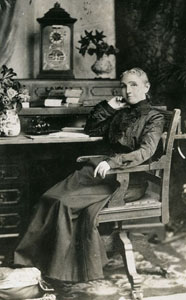 This Goodly Land
This Goodly Land
Augusta Jane Evans Wilson (May 8, 1835–May 9, 1909)

Other Names Used
- Augusta Jane Evans: birth name
- Augusta Evans Wilson: married name
Alabama Connections
- Mobile, Mobile County: childhood residence, adult residence
Selected Works
- Evans, Augusta J. Beulah. New York: Derby & Jackson, 1859. Rpt. Baton Rouge: Louisiana State University Press, 1992. An online version of Beulah is available from Wright American Fiction, 1851-1875.
- Evans, Augusta J. Macaria, or, Altars of Sacrifice. New York: J. Bradburn, 1864. Rpt. Baton Rouge: Louisiana State University Press, 1992. An online version of Macaria is available from Wright American Fiction, 1851-1875.
- Evans, Augusta J. St. Elmo. New York: Grosset & Dunlap, 1866. Rpt. Tuscaloosa: University of Alabama Press, 1992. An online version of St. Elmo is available from Wright American Fiction, 1851-1875.
- Wilson, Augusta Evans. Vashti, or, Until Death Us Do Part. New York: Carleton, 1869. An online version of Vashti is available from Wright American Fiction, 1851-1875.
- Wilson, Augusta Evans. At the Mercy of Tiberius. New York: G. W. Dillingham, 1887. An online version of At the Mercy of Tiberius is available from Google Book Search.
- Wilson, Augusta Evans. A Speckled Bird. New York: G. W. Dillingham, 1902. An online version of A Speckled Bird is available from Internet Archive's American Libraries.
Biographical Information
Augusta Jane Evans Wilson was born in Columbus, Ga., to well-to-do parents. When her father’s business went bankrupt in the 1840s economic depression, the family moved, first to Texas, then to Mobile, Ala., where she spent the rest of her life. Wilson had little formal education, but her mother educated her at home and encouraged intellectual pursuits. She began writing as a way to supplement the family’s income. Her second novel, Beulah, published in 1859, sold well and was well received by critics. Wilson’s Christian faith influenced her writing, which tended to feature virtuous heroines who educated themselves by individual studies and then gave up their studies to accept their roles as Christian wives.
Wilson’s devotion to the Southern cause was so strong that, in 1860, she broke off her engagement to a Northern journalist because of his support for Lincoln. During the Civil War, she wrote for a Mobile newspaper and nursed Confederate soldiers in a hospital she helped organize. Her novel Macaria, which idealized the sacrifices of Confederate women, was so popular that a Union general banned it from his ranks and confiscated and burned copies of it. Her novel St. Elmo was the third most popular nineteenth-century American novel, after Uncle Tom’s Cabin and Ben-Hur. In 1868, she married a wealthy older widower and neighbor. She continued to write, in addition to managing his household, but her later novels were not as popular. Wilson died at age seventy-four and was buried in Mobile’s Magnolia Cemetery amid the graves of Confederate soldiers.
Interests and Themes
Augusta Jane Evans Wilson was one of the nineteenth century’s best-selling authors and a national celebrity. The sales of her domestic novels made her one of the first women in America to generate a substantial income from her writing. Although she was conservative in religious, social, and political matters, her books advocated the importance of women’s intellectual development.
For More Information
Please check your local library for these materials. If items are not available locally, your librarian can help you borrow them through the InterLibrary Loan program. Your librarian can also help you find other information about this author.
There may be more information available through the databases in the Alabama Virtual Library. If you are an Alabama citizen, AVL can be used at your public library or school library media center. You can also get a username and password from your librarian to use AVL at home.
Reference Books
- Bynam, Rusty, and Geoffrey Hamilton. Augusta Evans Wilson: Stateswoman and Author. Huntsville: Writers Consortium Books, 1989. For younger readers.
- Fidler, William Perry. Augusta Evans Wilson, 1835-1909: A Biography. Tuscaloosa: University of Alabama Press, 1951.
- Knight, Denise D., and Emmanuel S. Nelson. Nineteenth-Century American Women Writers: A Bio-bibliographical Critical Sourcebook. Westport, Conn.: Greenwood Press, 1997.
- Riepma, Anne Sophie. Fire & Fiction: Augusta Jane Evans in Context. Atlanta, Ga.: Rodopi, 2000.
- Wilson, Augusta Jane Evans. A Southern Woman of Letters: The Correspondence of Augusta Jane Evans Wilson. Ed. Rebecca Grant Sexton. Columbia: University of South Carolina Press, 2002.
Reference Book Chapters and Encyclopedia Entries
- Williams, Benjamin Buford. "Augusta Evans Wilson, Successful Domestic Novelist"; A Literary History of Alabama: The Nineteenth Century. Rutherford, N.J.: Fairleigh Dickinson University Press, . 183-194.
Reference Book Prefaces
- Faust, Drew Gilpin. Introduction: Macaria, a War Story for Confederate Women. Macaria:, or, Altars of Sacrifice by Augusta Jane Evans. Ed. Drew Gilpin Faust. Baton Rouge: Louisiana State University Press, . xiii-xxix.
- Fox-Genovese, Elizabeth. Introduction. Beulah by Augusta Jane Evans. Ed. Elizabeth Fox-Genovese. Baton Rouge: Louisiana State University Press, . xi-xxxvi.
- Roberts, Diane. Introduction. St. Elmo by Augusta Jane Evans. Tuscaloosa: University of Alabama Press, . v-xxiii.
Reference Web Sites
- "Wilson, Augusta Jane Evans (1835-1909)". Handbook of Texas Online. 2001. General Libraries at the University of Texas at Austin and Texas State Historical Commission. http://www.tshaonline.org/handbook/online/articles/WW/fwi49.html.
- Frear, Sara S. "Augusta Jane Evans Wilson". The Encyclopedia of Alabama. 2008. Alabama Humanities Foundation and Auburn University. http://www.encyclopediaofalabama.org/face/Article.jsp?id=h-1072.
- Gabler-Hover, Janet. "Augusta Jane Evans (Wilson) (1835-1909)". New Georgia Encyclopedia. 2002. Georgia Humanities Council and University of Georgia Press. http://www.georgiaencyclopedia.org/nge/Article.jsp?path=/Literature/Fiction/Authors&id=h-453.
Location of Papers
- Alabama Department of Archives and History
- University of Alabama
- University of Virginia
Photo by W. A. Reed; from Life and Works of Augusta Evans Wilson, by Sidney C. Phillips, 1937.
Last updated on May 30, 2008.